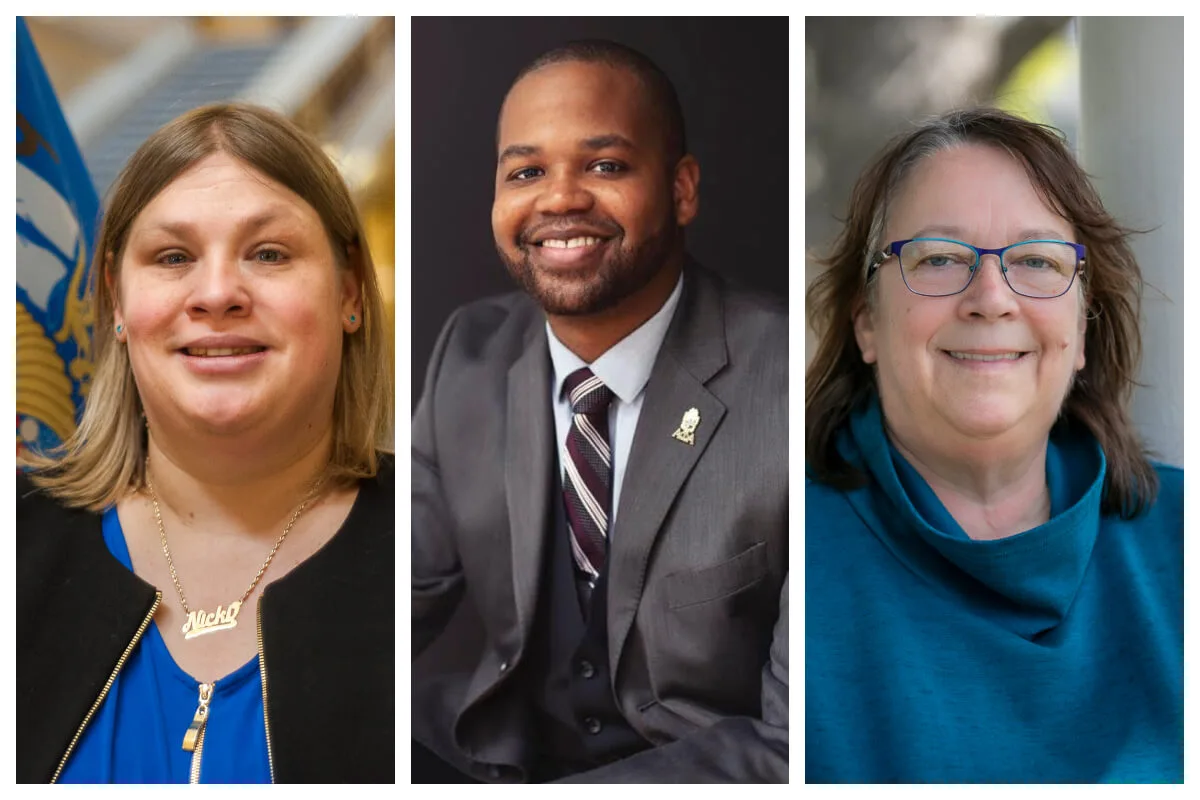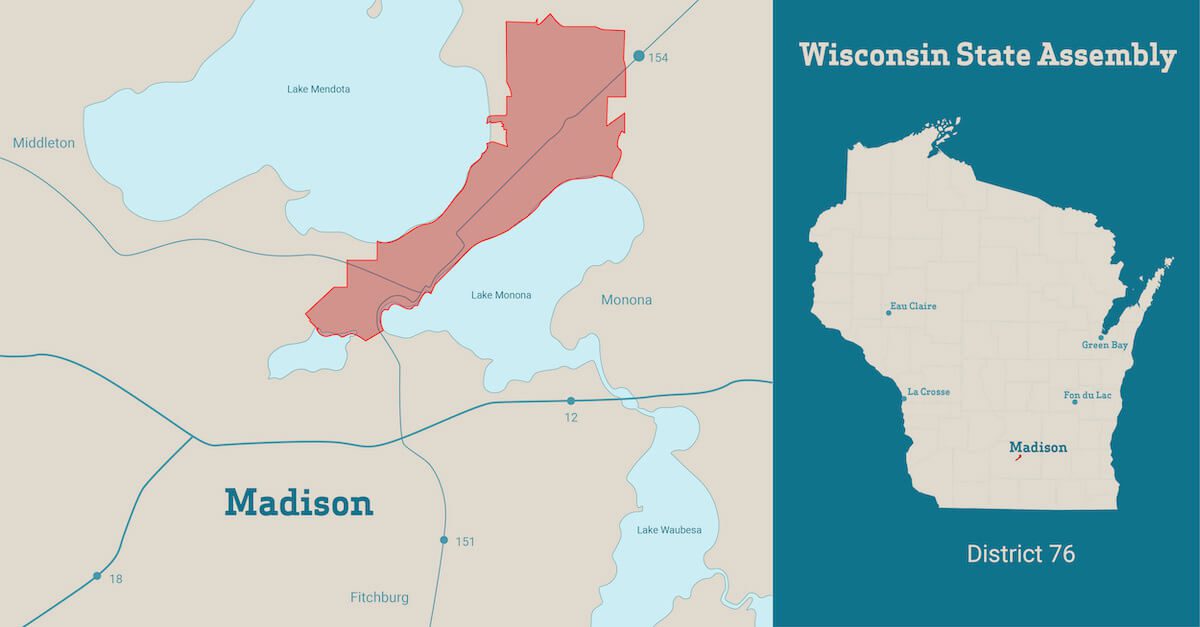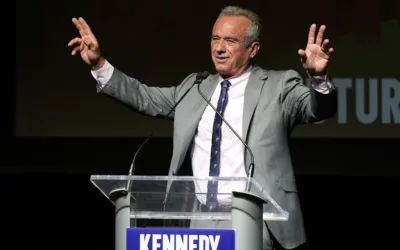
#image_title
Seven Democrats are vying for Rep. Chris Taylor’s seat. Here is a look at three of the contenders.
Editor’s Note: Rep. Chris Taylor announced her decision to not seek another term in office at the end of March. She was subsequently appointed by Gov. Tony Evers as a Dane County Circuit Court judge, a position she will start on Aug. 1.
Vying for her seat that covers a majority of Madison’s east side and downtown are seven democrats who will square off in the Aug. 11 primary. The candidates are Dewey Bredeson, Heather Driscoll, Francesca Hong, Ali Maresh, Nicki Vander Meulen, Marsha Rummel, and Tyrone Cratic Williams. Profiles will post Wednesday, Thursday, and Friday.
Read the interviews with Bredeson and Driscoll here.
Read the interviews with Hong and Maresh here.
UpNorthNews: What is the top issue facing the people in your district?
Marsha Rummel: The pandemic has turned life upside down. People in my district have lost jobs. Their healthcare, if they had employer sponsored insurance, is at risk or gone. Many parents face the stress of online schooling for their kids while working at home or finding safe and affordable childcare if they are working on the frontlines.
The end of the state moratorium on evictions leaves renters and homeowners without protection and exacerbates the housing crisis we are in. The shuttering of local businesses has been devastating.
Many small businesses were not eligible or already spent federal payroll protection assistance. The disregard for public health and the lack of adequate financial assistance by state and national Republican controlled legislatures is worsening the impact of the disease on the economy and our safety.
UNN: Describe what unique life experiences would make you both an empathetic and effective lawmaker.
Marsha Rummel: I grew up on the South Side of Chicago in an interracial family. On Dec. 4, 1969, Black Panther Party leader Fred Hampton was killed by Chicago Police in his bed when he was asleep. It shocked me. I learned then and have been reminded over the years, that the state can kill you if they want to.
The regular killings and police murder of Breonna Taylor, George Floyd, our own Tony Robinson and so many others have reached a tipping point. Millions of people around the country are demanding racial justice and reimagining community-based policing. I am committed to repair the damage of centuries of systemic racism.
I ran for Common Council to fight for affordable housing, living wage jobs, safe drinking water and green economic development for my east side district. I actively encourage people to stand up and use their power to make change.
As President of the Board of the Marquette Neighborhood Association for 5 years and as Alder for 13 years, I have organized and facilitated hundreds of neighborhood meetings.
I listen, discuss differences, and propose solutions. I have a track record of accomplishments. The police killing of Tony Robinson in 2015 made it clear that the city needed to review police policies and procedures.
I was a leader in creating the Ad Hoc Review Committee in 2015. As Common Council President from 2017-2018, I chaired the President’s Work Group on Police and Community Relations in an effort to address the trust gap between the police and members of the community, and bear witness to the disproportionate impact of policing and the criminal justice system for people of color.
We developed 13 recommendations that included directives to improve MPD’s standard operating procedures around use of force, to establish safeguards to protect emotionally disturbed people, to ensure officer wellbeing, and create an implementation plan to adopt a root cause analysis process to review critical incidents.
I know firsthand the struggle of small businesses and the need to protect workers’ rights. I was one of the founders and served for 22 years as the financial coordinator and book buyer for the Rainbow Bookstore, a cooperatively owned bookstore that served the UW campus and the progressive community. I faced the challenges posed by big box stores and online retailers. Our coop paid living wages and provided health insurance.
My grandmother and my stepmom were proud members of the Chicago Teachers Union. I am a member of AFSCME. When Act 10 eliminated union rights for most public employees, I was in the streets along with tens of thousands of residents.
The Occupation of the State Capitol still lives inside me. The 2011 Uprising is a key motivator for why I am running for the Wisconsin Assembly. I want to undo the damage the Walker administration and Republicans unleashed in Wisconsin.
UNN: Gov. Tony Evers and Lt. Gov. Mandela Barnes introduced a package of nine bills on June 19 aimed at reforming police transparency and accountability in response to ongoing protests over the murder of George Floyd. Do you believe this package does too little? Explain.
Marsha Rummel: Yes. Too many compromises were made to Republicans in order to pass this bill. We need community peacekeeping projects that could shift much of the work of police to trained community mental health workers.
UNN: Funding for K-12 education is an ongoing issue in Wisconsin, now exacerbated by the need for virtual learning due to COVID-19. What do lawmakers need to pass to ensure that low income students in your district are not left behind?
Marsha Rummel: We need parity in internet access and computer availability, coupled with support for those students who don’t have space or safety to continue school at home.
UNN: Your district includes a portion of Dane County, which has the highest infant mortality rate for Black babies in the country. What could you do as a member of the Legislature to begin to address this problem?
Marsha Rummel: I support black led initiatives to invest in and train more black doulas to improve the health and life chances of black babies and their moms. We need to address the racial wealth gap to overcome generational struggles for economic security.

UpNorthNews: What is the top issue facing the people in your district?
Nicki Vander Meulen: Racism is the top issue facing people in my community. Racial tension is at a all time high. We need to come together and demand structural change in policing, education, and black women’s health to truly create lasting and meaningful change in the 76th District.
UNN: Describe what unique life experiences would make you both an empathetic and effective lawmaker.
Nicki Vander Meulen: My legal background gives me the knowledge to work in the legislature but its my experience working with diverse populations and individuals with disabilities that truly sets me apart. I started school prior to the passage of the ADA, and I was kicked out of preschool because I couldn’t walk right.
At age six, my parents, with the help of attorney Jeff Spitzer-Resneck, fought to get me into public school when my district wanted me to attend school in an institutionalized setting. Eventually, I received my law degree from the University of Wisconsin. These educational experiences combined with my 16 years as a juvenile defense attorney shaped my future and made me the advocate I am today.
UNN: Gov. Tony Evers and Lt. Gov. Mandela Barnes introduced a package of nine bills on June 19 aimed at reforming police transparency and accountability in response to ongoing protests over the murder of George Floyd. Do you believe this package does too little?
Nicki Vander Meulen The Evers plan does not go far enough to reform our broken system. I have a ten-point plan to reform our police That focuses on the use of body cameras, demilitarizing the police, by revoking grant funding for those agencies that continue to use military grade weapons.
I would also get rid of the qualified immunity doctrine and require police to collect data on every traffic stop. Finally, I would establish citizen review boards that are independent of state and local government to create policies around handling police misconduct.
UNN: Funding for K-12 education is an ongoing issue in Wisconsin, now exacerbated by the need for virtual learning due to COVID-19. What do lawmakers need to pass to ensure that low income students in your district are not left behind?
Nicki Vander Meulen: I am opposed to reopening our schools for in-person instruction this fall. However, if schools are reopened the legislature must pass a bill funding PPE. Secondly, the legislature must pass a bill funding PPE equipment for all staff and create a hazard pay rule for those teachers who are risking their lives and livelihood for their students.
Finally, the legislature must fund childcare so that parents can go back to work while their children are in school virtually. Lawmakers also need to pass a bill covering the costs of high speed internet and wi-fi hotspots to provide low-income students access to technology they need for school and work.
UNN: Your district includes a portion of Dane County, which has the highest infant mortality rate for Black babies in the country. What could you do as a member of the Legislature to begin to address this problem?
Nicki Vander Meulen: The first thing I need to do is listen to Black women. Too often Doctors and other health professionals minimize Black Women’s health concerns especially during pregnancy. Next, I would form a partnership between hospitals and the Black women’s health center to create a community based response team for Black and Brown women.
This team would consist of medical experts, nurses, and community advocates, and be focused on providing medical, financial and housing support for Black women. Finally, I would incentivize those scholars who want to focus on Black women’s neonatal health by providing grants and scholarships to nurses and college students who wish to enter the health care profession.
UpNorthNews: What is the top issue facing the people in your district?
Tyrone Cratic Williams: My district’s top issue is creating safe, inclusive and equitable frameworks in education, the workplace, and health care when responding to the ever-changing challenges caused by Covid-19.
UNN: Describe what unique life experiences would make you both an empathetic and effective lawmaker.
Tyrone Cratic Williams: Growing up as a Black male in Dane County—one of the statistically worst counties to raise a Black child in the nation— and my experience as a Police Officer and financial literacy educator provides me with a unique perspective.
Being on both sides of institutional power has allowed me to understand the systems at play and provide crucial life skills within the very community I grew up in. No other candidate in this race has the grassroots experience on a personal or professional level to know and understand the true needs of the most vulnerable members of my community and bring their voices to the Capitol for advocacy.
UNN: Gov. Tony Evers and Lt. Gov. Mandela Barnes introduced a package of nine bills on June 19 aimed at reforming police transparency and accountability in response to ongoing protests over the murder of George Floyd. Do you believe this package does too little? Explain.
Tyrone Cratic Williams: The Governor’s proposals are a great start; however, more could be done. As I wrote in my op-ed in the Capitol Times, we also need to increase recruitment and hiring of multicultural and multilingual officers, increase transparency on use of force and complaint reporting, expand restorative justice, require body cams, commit to providing culturally competent training in academies and for current officers, give communities most affected by police violence significant influence in the hiring of officers, policy review and much more.
Many of my policies have already been passed in the state of Colorado via their historic police reform bill.
UNN: Funding for K-12 education is an ongoing issue in Wisconsin, now exacerbated by the need for virtual learning due to COVID-19. What do lawmakers need to pass to ensure that low income students in your district are not left behind?
Tyrone Cratic Williams: Whenever I encounter a problem, I always approach it from an equity standpoint. To ensure equity in schools amidst COVID-19, we need an intersectional approach.
Lawmakers must make sure that low-income students have access to resources like quality internet and computers and increase funds to make these tools available at home or with crucial community resources like the Public Library and community centers.
We need to expand our ability to provide healthy food options for students who would otherwise get these resources inside a school building. We also need to expand child care and leave time options to allow more flexibility for parents to take time off of work in the case that they or their child is sick or needs supervision during the day.
UNN: Your district includes a portion of Dane County, which has the highest infant mortality rate for Black babies in the country. What could you do as a member of the Legislature to begin to address this problem?
Tyrone Cratic Williams: We begin by working in partnership with the families most affected by this to ensure their needs are being met. We can also increase education on implicit bias for health care workers who are treating these patients.
Of course, this issue is intersectional and must be addressed as such. We cannot talk about high infant mortality rates without thinking about the fact that Black people in Dane County have some of the worst outcomes in terms of quality of life.
Thus, to improve infant mortality rates for Black babies, we must also address access to quality health care, affordable housing, nutritious food, education and career development and wealth building strategies.

New Biden rules deliver automatic cash refunds for canceled flights, ban surprise fees
In the aftermath of a canceled or delayed flight, there’s nothing less appealing than spending hours on the phone waiting to speak with an airline...

One year on the Wienermobile: The life of a Wisconsin hotdogger
20,000+ miles. 16 states. 40+ cities. 12 months. Hotdogger Samantha Benish has been hard at work since graduating from the University of...

Biden makes 4 million more workers eligible for overtime pay
The Biden administration announced a new rule Tuesday to expand overtime pay for around 4 million lower-paid salaried employees nationwide. The...

‘Radical’ Republican proposals threaten bipartisan farm bill, USDA Secretary says
In an appearance before the North American Agricultural Journalists last week, United States Department of Agriculture (USDA) Secretary Tom Vilsack...




